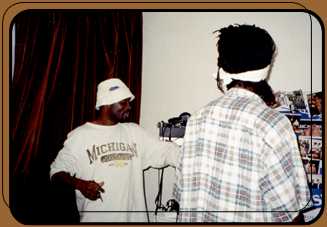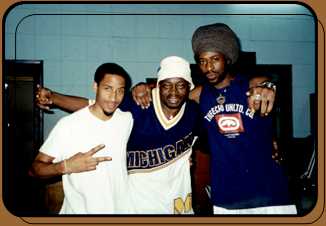|
|
|
|
Although American Hip-Hop has its own unique sound, many of its artists and listeners never stop to question its origins. Believing most of the modern music forms produced by American blacks ultimately originated in Africa, it is no wonder that the tendency of many Americans to dismiss African life as undeveloped and uncivilized irritates the African people. Those in the music industry feel that this ignorance of the true Africa and the lack of desire to learn about it is only making it harder to gain the consideration that they need in order to build a respectable Hip-Hop culture. "It's hard for us to be successful in the US but it is not hard for Americans to be successful here," says Claver. If it's number 1 in the US, it's number 1 all over the world. It's like what Biggie told me in New York. I said, 'Biggie you're known in Africa.' 'Oh yeah really? Africans know my music?' 'Yeah, do you want to come to Africa and perform?' 'Of course, man!' He said, 'I'm going to take all the Pygmies, all the Zulu and rip for them. They're going to enjoy their selves, throw your spears in the air!' You see, how he views Africa? It's the jungle, man!" 
Claver, Bony, and Shahin, who has been silent up to this point, laugh. "This is a true story, I was shocked, and the people behind me were laughing at me. They took me like some kind of joke. I was shamed. This is a problem, it seems to me that a lot of rappers talk about Africa and wear it on their chest but don't really know anything about Africa. And they don't try to find the real issue, to really know The MotherLand. You should not be a rapping as an African American, saying I'm from Africa, The MotherLand, and you see Africa as the jungle, with tribes, Zulus and Pygmies as the only people. If you pick up the Yellow Pages, you're going to see there are embassies. Every young kid should pick up the phone, say, 'Hello, Ivory Coast Embassy, I want to have some pictures of your country. I want to see somebody and talk about your country.' But those people don't want to know really about The MotherLand. What they want to know is how to get money, and that, for me, is negative. The popular rappers in the United States, have money but they don't want to use it to try to open their minds or their culture." Unlike most African people, Claver has had the opportunity to visit the US - pictures litter his walls featuring himself with many popular American R&B and Hip-Hop artists, including the Notorious BIG. Although he acknowledges the ignorance that many of the American people have of African culture, he respects their culture and music and envisions big things in the future for his continent and for blacks worldwide, if the American blacks would show more of an interest in Africa and foreign Hip-Hop. "If you go to New York, you see BET," says Claver. "Black Entertainment Television. Why doesn't the television say, 'OK, I need a documentary about African culture and we're going to show that Africa is not only about war and famine.' Why don't our brothers do that? What is that guy's name, Bill Bellamy? He chose Paris to make a Hip-Hop show instead of coming to Africa and making his show from The Ivory Coast. Why? Because they don't really know Africa...the brother is not a real brother." "But I know there are some of them who really think about their culture, about The MotherLand, who came to Africa. Public Enemy came to Africa, so did Louis Farrakkan. They know what Africa is about. But as for the others, I think that the African-Americans need to change their mindset. And the people who have the money must come to Africa. They can have concerts, perform, and there are rappers here that they can make connections with. They can work with us and try to mix American and African music. If DJ Premier came here and said he wanted some African rhythm to put on his CD, it would be dope, man. They have all these opportunities." Africa simply does not have the money to promote the music, which is why it gives them pain to see American blacks making so much money but seeing so little of that money coming into Africa. "One million dollars for promotions in the US is nothing" says Claver. "So if someone were to come here and spend the same thing, it would be hours and hours of tape. Michael Jackson came to Abidjan and Gabon. But I'm telling you, the white people don't want that, they don't want these things to be known. Because if it's known, it's going to empower Africa. You know how many whites are going to be upset that they have to deal with us? People are going to come with their money, and their dollars are powerful here. They could make this country and continent more rich, and they don't want it, because it will make us powerful " 
In Abidjan, Hip-Hop has not been promoted because the media has not considered it a part of the African culture. There are a few radio and television hosts who occasionally mix in some Hip-Hop with their regular material, but there are very few shows dedicated to the promotion of Hip-Hop music. There is a Hip-Hop TV show that is aired for only one hour every Saturday and there is Claver's radio show, Zone Rap, which is aired seven hours a week. "To this day, I am the only one who plays strictly Hip-Hop on my show, " says Claver. "But I'm waiting, hoping things are going to change. They have not really promoted rap here. It's a political decision, and it's wrong. The people who run the radio stations and TV stations are not in touch with the streets and the youth. That's the reason it's not promoted like it should be." While the sound is slow to circulate the African continent, no one who visits the metropolitan areas of West Africa could debate the love that the people have for music or the influence of Hip-Hop on their culture. It is truly reminiscent of the early stages of Hip-Hop in America, when it was viewed as a lesser form of music by everyone except the passionate youth that the music represented. As the opening day of the art exhibition fades into history, the young African men continue to dance. Even without access to radio and TV, the fact that Hip-Hop has managed to grab and hold on to the African youth exemplifies its popularity and growth throughout the world. Now, the challenge for African Hip-Hop artists is to open minds not only to the international influence of Hip-Hop, but also to the Uniqueness African culture.
I know you where you are coming from/But can you feel the sound of the drum These Rockstone lyrics express the style and sentiments of many African Hip-Hop artists as they strive to bring their music and culture out of the shadows and into the light. But like most processes, it will take time. "Hip-Hop started here in '89," says Bony. "The first album that went gold, which for us is 100,000 was in '89 so you can say that's when it started. It's hard to say when Hip-Hop exploded. For me, that hasn't happened yet. It's alive, but it hasn't really arrived. Now, everybody talks about rap, but for me, maybe it's because I work inside, I think there is a lot to do. We're working on it." And the beat goes on...
|